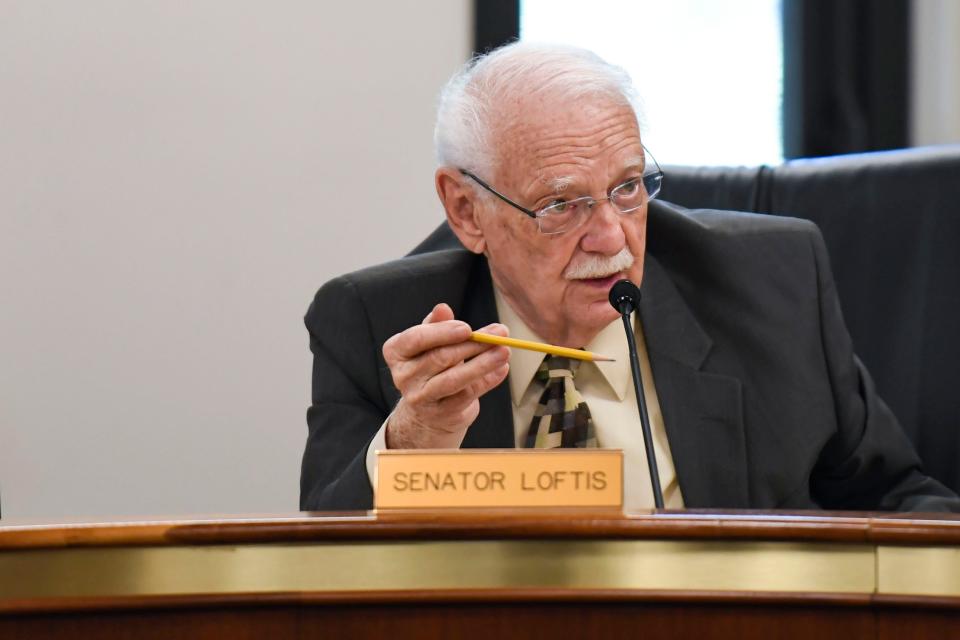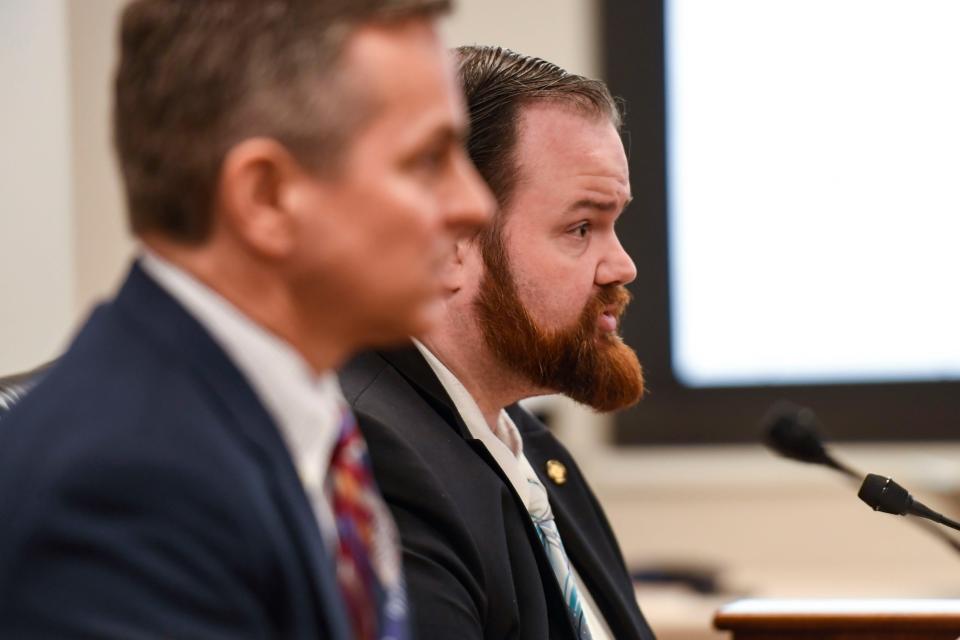This week in SC politics: Bill to ban gender-affirming care for teens advances
- Oops!Something went wrong.Please try again later.
- Oops!Something went wrong.Please try again later.
The fate of South Carolina's transgender residents remains uncertain as lawmakers consider two bills that would ban gender-affirming healthcare for transgender youth and restrict residents from being able to change the gender on their birth certificate.
The Senate Medical Affairs subcommittee advanced the two Republican-backed bills on party lines. The meeting was strained from the very offset. Scores of LGBTQ advocates gathered outside the meeting as lawmakers limited testimonies to twelve speakers per bill. Advocates complained about the committee's sign-up process and said that other hearings did not have the same limitations.
Sen. Richard Cash, R-Anderson, who chaired the subcommittee, said he wanted to give equal representation to two vastly opposing medical opinions on transgender healthcare. But that proved to be a hard task for the Anderson lawmaker as medical professionals, parents and LGBTQ advocates outnumbered supporters of the two bills.
Let's dive into what happened.

'Nationwide' issue: 11 states have already introduced bills targeting transgender health care in 2023
Does the state have a compelling interest in restricting gender-affirming healthcare?
Major medical organizations and doctors back gender-affirming healthcare and say it is often critical to a transgender child's survival.
But Republican lawmakers remained concerned about the age at which a child is mature enough to make life-altering decisions for themselves.
Sen. Dwight Loftis, R-Greenville, questioned the meaning of "gender-affirming" and parents who consent to provide healthcare to their children. "We can support our children without affirming their desires," Loftis said. "But if affirming means 'okay, it's okay, whatever you want', that's not, in my mind, good parenting."

But a majority of public attendees, many of whom were caretakers of transgender youth, said parents and their transgender children go through several processes to get to the point where they are given puberty blockers and hormones. A pediatrician must first diagnose and recommend mental health counseling. A counselor then confirms whether the pediatrician’s diagnosis was correct. Doctors assess the right time for the child to take blockers.
Lynn Teague with the League of Women Voters questioned if the state had a compelling interest in restricting transgender rights. No person younger than 18 was receiving gender transitioning surgery in South Carolina. The few people who destransitioned and testified in support of the bill were over 18 when they got surgical procedures done and got it out of South Carolina, Teague said.
"We don't prohibit every medical procedure that can turn out badly," Teague said. "If we did, no one would ever get knee replacement or back surgery."
Much of Teague's argument is likely to be the crux of a lawsuit if the bill becomes law. Currently, similar laws are blocked by federal judges in Alabama and Arkansas.
One parent, Dylan Dittrich-Reed, 39, drove from Clemson with his transgender son, Niko. Almost 12, Niko said that he wanted to show lawmakers how gender-affirming care had helped him.
"My body does not match who I really am," wrote Niko in his testimony shared with the Greenville News. "And I have spent hours and hours, crying over something, something I thought I couldn't change." Things are still difficult, he continued, but gender-affirming care showed him that there was a light at the end of the tunnel.
The two didn't get to testify during the hearing because lawmakers cut the meeting short.

Previous reporting: SC Senate debates anti-transgender laws that ban gender identity, birth certificate changes
Will the state accept DHEC's proposed regulations to amend birth certificates?
In South Carolina, if a resident wants to change the gender on their birth certificate, they have to get a court order from a judge and take it to DHEC.
Generally, a judge reviews an affidavit from a doctor affirming a person's transition. But a lack of clear guidelines means there is no uniformity. Where some judges authorized a gender marker change, some did not, and multiple applicants remained uncertain of how long the court process would take.
Caleb Cox, Director of Vital Statistics at DHEC, said last week that DHEC's proposal could streamline and standardize the process by relying on agency doctors who have the expertise to review medical documents and authorize a gender marker change. This would take family courts out of the picture, making the change more of an administrative process than a judicial one.

But it is unclear if lawmakers will take up DHEC's proposal. The subcommittee favored a bill by Sen. Danny Verdin, R-Laurens, which would mandate a gender marker change only if the original certificate if it had a clerical error in it or if the resident had it changed within twelve months of their birth due to a medically verifiable sex development issue.
Previous testimonies by medical professionals such as Dr. Elizabeth Mack with the American Academy of Pediatrics said this bill could potentially harm intersex residents or other children whose sexual organs often take more than just a year to develop.
Earlier this month, Tara Borelli with Lambda Legal Services said this bill would push South Carolina to join the ranks of the most extreme outliers in the U.S., as very few states have historically banned updates to birth certificates. All of those states were sued.
What's the likelihood of these bills passing this year?
The Statehouse is at the halfway point of the session. This means that Senators are expected to address bills that were sent to them from the House.
It is unlikely that both are going to clear the Senate this year. The Senate will debate the hate crimes bill on April 11, and Upstate lawmakers are expected to present staunch opposition to the LGBTQ protections in the bill.
More: This week in SC politics: House passes Hate Crimes bill. Some lawmakers fixate on sex, gender.
Meanwhile, Sen. Tom Davis, R-Beaufort, has been lobbying to pass the medical marijuana bill again this year. This is the eighth time he's tried to pass this legislation.
More: Kentucky bill legalizing medical marijuana signed into law
What to watch for this week in SC politics:
On Tuesday, April 4, 2023, at noon, House lawmakers will debate S.120, the death penalty shield law bill, which would make confidential the name of pharmaceutical companies that provide drugs for lethal injections used in executions.
Devyani Chhetri covers the South Carolina State House and is a watchdog SC government reporter. You can reach her at dchhetri@gannett.com or @ChhetriDevyani.
This article originally appeared on Greenville News: This week in SC Politics: Bill to ban gender-affirming care advances

